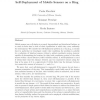Free Online Productivity Tools
i2Speak
i2Symbol
i2OCR
iTex2Img
iWeb2Print
iWeb2Shot
i2Type
iPdf2Split
iPdf2Merge
i2Bopomofo
i2Arabic
i2Style
i2Image
i2PDF
iLatex2Rtf
Sci2ools
116
click to vote
TCS
2008
2008
Self-deployment of mobile sensors on a ring
Mobile sensors can self-deploy in a purely decentralized and distributed fashion, so to reach in finite time a state of static equilibrium in which they cover uniformly the environment. We consider the self-deployment problem in a ring (e.g., a circular rim); in particular we investigate under what conditions the problem is solvable by a collection of identical sensors without a global coordinate system, however capable of determining the location (in their local coordinate system) of the other sensors within a fixed distance (called visibility radius). A self-deployment is exact if within finite time the distance between any two consecutive sensors along the ring is the same, d; it is -approximate if within finite time the distance between two consecutive sensors is between d - and d + . We prove that exact self-deployment is impossible if the sensors do not share a common orientation of the ring. This impossibility result holds even if the sensors have unlimited memory of the past,...
Related Content
| Added | 15 Dec 2010 |
| Updated | 15 Dec 2010 |
| Type | Journal |
| Year | 2008 |
| Where | TCS |
| Authors | Paola Flocchini, Giuseppe Prencipe, Nicola Santoro |
Comments (0)

